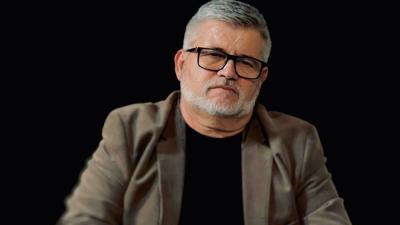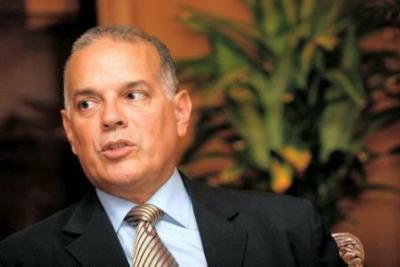Carolina Barrero: “In Cuba there is no food or medicine, but the regime builds hotels rather than hospitals”
Interview with Carolina Barrero, activist for the defence of human rights in Cuba, self-exiled in Spain since February 2022.
Álvaro Peñas: I believe that self-exile is one of the Cuban regime's habitual methods of getting rid of opponents.
Carolina Barrero: Yes, it is a recurrent practice that they started to use since the triumph, or rather the disaster, of the armed guerrilla led by Fidel Castro. From the beginning they have used all methods and all repressive tactics to neutralise any form of dissidence and one of them is forced exile. In my case, I left after having been asked to do so many times, with threats that otherwise I would go to prison. In Cuba, I have four cases for crimes against state security. They were opened by investigators in Villa Marista - a well-known prison and the most important state security criminal investigation centre in Havana. There are criminal investigators there who are trained to open legal cases against opponents simply for dissent. Normally, the criminal cases they initiate are allegedly for common crimes - so that international public opinion could believe the opponents are criminals, common delinquents, vandals, people who threaten public order or are guilty of contempt against the police authority. To show contempt, it is enough to ask: “Why am I being taken to prison?” This is very common, because there are many irregular arrests without any explanation. You are forcibly stopped in the street, put in a patrol car and taken to a police station where you can spend days or weeks, and disappear without your family or public opinion being informed. Simply by refusing to accompany the police in an arbitrary detention, you can be charged with contempt of authority. I have been accused of contempt of authority and also of “inspiration to commit a crime”, which occurs when you publicly demand the right to demonstrate. I was threatened many times and I was placed under house arrest without any legal justification. This is what happens when there is an oppressive government that does not account to justice for the exercise of its power. My departure was precipitated because I was blackmailed with the safety of other people, especially the mothers of political prisoners who protested with me in front of a court on 31 January 2022. On that day, nine minors were tried there for sedition. I accompanied some of their mothers and when the boys came out, we shouted: “Freedom”. That’s why we were arrested and beaten, and I was told that if I didn’t leave, those mothers would end up in jail for public disorder. Because the Cuban regime thinks that mother’s love, her going to see her son and asking for his freedom, represents public disorder. This is why I came to Spain.
In recent years there have been more and more protests in Cuba for different reasons, which are perhaps now more visible thanks to social networks. Do you think that more and more people are losing their fear of protesting against the regime?
I think people have always protested against the dictatorship in Cuba, especially at the beginning, in the 1960s. And one would have to make a profound and very critical review of the dead, the detained and the condemned from the 1960s to the 1990s. What has happened is that in recent years, thanks to the Internet, the protests have been able obtain a further reach, both among international public opinion and the Cubans themselves, who have also been able to learn about the level of resistance against the regime. Before, Cuba was blind and everything that went abroad was controlled by the propaganda organs of the Communist Party, national press, television and the Cuban diplomatic apparatus, which is also part of this great propaganda machine. This was the only thing that reached the outside world and this was what the world believed. But thanks to the Internet it can now be contradicted and any citizen can give his or her opinion and show how the police beat or arbitrarily detain people. And also, at the same time, it is evident that there is a process of decay of the regime. The mask of the myth of revolution has fallen off and it is becoming increasingly clear that a corrupt military elite is in power, and even the groups of people that used to be more sympathetic can no longer ignore this.
What do you mean when you say that the myth of the revolution has fallen?
There is an important sector of international public opinion, especially on the Left, that is still looking favourably, with a romantic vision, at the revolution process, as if it had been at some point a process of social justice. When I talk about the myth, I am talking about the propaganda of the Communist Party and the official propaganda regarding things like education or health. Something that in reality is nothing more than the services that any state must provide and that in no case, if they were achieved at the levels they claimed, could justify the violations of human rights or the existence of dictatorship. The myth of the revolution, that revolutionary epic that the regime, that Fidel Castro’s dictatorship was selling all over the world and that made many people look favourably on what was really happening in Cuba, has nothing to do with reality.
Have you encountered many people with this romantic image of Cuba in Spain?
All Cubans have experienced this in Spain and all over the world. There are people who get annoyed when you tell them what life is like in Cuba, people who haven’t even been to Cuba or who have stayed at a hotel in Varadero or spent three days in a very picturesque house in Old Havana, dancing and drinking mojitos. These are the ones who will call you a mercenary, imperialist or capitalist. And this is also very sad for the Cubans, who feel quite alone. Let me give you a more concrete example. Here in Spain there are institutions that open their doors to our brothers from Nicaragua, something I completely agree with, and they can come there and talk about politics, speaking against Ortega. But the Cubans only open their doors to us when it comes to cultural activities. If we want to talk politically about human rights violations in Cuba, there is no agenda for that and there is no date in any year, neither in 2023 nor in 2024. The truth is that the Cuban opposition and exiles have been very lonely in Spain, because the romantic image of the Cuban revolution is very present here. Also because Spain in particular is a country that has various economic interests in Cuba, and it seems that taking care of those interests has sometimes a stronger impact on state policies than human rights. We have asked the Spanish State for a change in its policy, and in fact have delivered letters to the Congress of Deputies as well as to Brussels because the European Union’s foreign policy towards Cuba is very much influenced by the Spanish policy. We have asked at all levels for coherence in foreign policy towards Cuba and for Spain to be able to take the side of democratic forces.
In contrast to the romantic image that still persists, what is the reality like for a Cuban living under socialism?
It is a disaster. There are no medicines in Cuba and it is not because of any sanctions. Medicines as well as food are received from the United States and from all over the world, but in many cases the regime resells them instead of using to meet the people’s needs. We have gone shopping in Cuban state establishments and they sell oil that comes with a label saying “WFP donation” (United Nations food programme). There are no medicines and there is no food, and every day we see images of elderly people in a state of malnutrition, some fainting in the streets, or children dying because no ambulance arrives. The situation inside the hospitals is truly terrifying: there is no capacity to attend to patients, there are no hygienic conditions, there is a lack of doctors, etc. Cuba uses doctors in a semi-slavery regime and sends them on medical missions. There are many UN studies on the conditions in which these people go on medical missions. To begin with, the regime keeps almost ninety percent of their salary and they are not allowed to leave the places where they stay. They are also forced to proselytise and spread ideological propaganda. This is why there are not enough doctors. The risks of entering a hospital in Cuba are unpredictable because anything can happen. However, the regime continues to build hotels rather than hospitals. They have recently held a festival in Cayo Santa María because there is a budget for this, but not for solving the problems of public health and education.
There is also money to export the revolution to Venezuela, logically in exchange for oil.
Of course there is. Or the most recent scandal of sending troops to fight against Ukraine. Many months ago the dictatorship’s military agreements with Belarus began to come to light. Then there were the visits of Lavrov, the Russian foreign minister, and General Patrushev to Havana. Yet people were reluctant to believe that there was any real collaboration with Russia and participation in the war. But in the end the news came out that Cuba was indeed sending troops to fight in the war against Ukraine on the Russian side. There are photos and videos of men and women dressed in military uniforms with the Cuban flag in Ukraine. This is not a new operation - they did the same in Africa, with Ethiopia and the war in Angola, or in Latin America, where they created Latin American guerrillas. And Cuba was at the origin of all this. Cuba’s imperialist vocation, which is probably the real imperialism, is undeniable for anyone who does the slightest bit of research. However, this is a regime that tends to victimise itself when in reality it is the victimizer. And its interventions in armed conflicts, not exactly in favour of democracy, should make those who still justify it think twice.
The Cuban government has tried to disassociate itself from this case, saying that these were deceived people who went there to work.
This is absurd. I wonder what Mr Josep Borrell, Mr Pedro Sánchez and the high European diplomacy are going to say. Especially Mr Borrell who has gone to Cuba to genuflect to Díaz-Canel and who has said that he is going to work more in the European Union to support Cuba and condemn the blockade. What is Mr Borrell going to say after seeing the evidence that Cuba has sent troops to fight on Russia’s side? We shall see whether he also denies this or not.
Cuba has gone from being isolated after the fall of the USSR to having the Sao Paulo Forum and the Puebla Group, and a growing influence throughout Latin America.
Yes, this is nothing new. We live in a world that since the fall of the Berlin Wall has begun to reconstitute itself. Thus we no longer live in a bipolar world of communism against the West, but in a network of authoritarian regimes that collaborate and work to perpetuate and maintain themselves in power. They visit each other, support each other, share military intelligence, share troops if they have to, and so on. We see that there is a conglomerate, a mafia, a global kleptocracy of autocracies such as Russia, Belarus, China, Cuba, Venezuela, Nicaragua or Bolivia. In Latin America there are still countries where certain democratic mechanisms work, but they are in a grey zone because they persecute the defenders of human rights, because they do not have freedom of the press, and because they also align themselves with these dictators – like in Brazil, Mexico and Argentina.
Where does this grey zone lead to?
To the most absolute misery and lack of freedom, because I have never seen a communist regime lead to anything else.
Read also
“The best weapon against propaganda is common sense and intuition”: An interview with Jorge Gómez
Jorge Gómez is a Navy officer in Reserve status and has worked in the field of intelligence during his time at CESID/CNI (National Intelligence Center), from 1992 to 2018, being a specialist in team management, crisis management and Human Sources Intelligence (HUMINT).
Álvaro Peñas
Javier Benegas: “The Right has to defend its own ideas, not be the antithesis of the Left”.
Javier Benegas is a publicist, writer and editor. Co-founder of the newspaper “Vozpópuli”, he currently directs the digital media Disidentia.
Álvaro Peñas
Alejandro Peña Esclusa: “Fraud is a crucial issue for the future of democracy in the West, because democracy is literally being stolen from us”
Interview with Alejandro Peña Esclusa, engineer, writer, analyst and political consultant. A pioneer of the first protests in his country against the Chavista regime, he was imprisoned for a year in El Helicoide (a prison notorious for its torture) and is still a political prisoner of conscience. An expert on the Sao Paulo Forum, he has written several books on the subject and has just published “Los Fraudes Electorales del Foro de Sao Paulo” (The electoral frauds of the Sao Paulo Forum).














Comments (0)